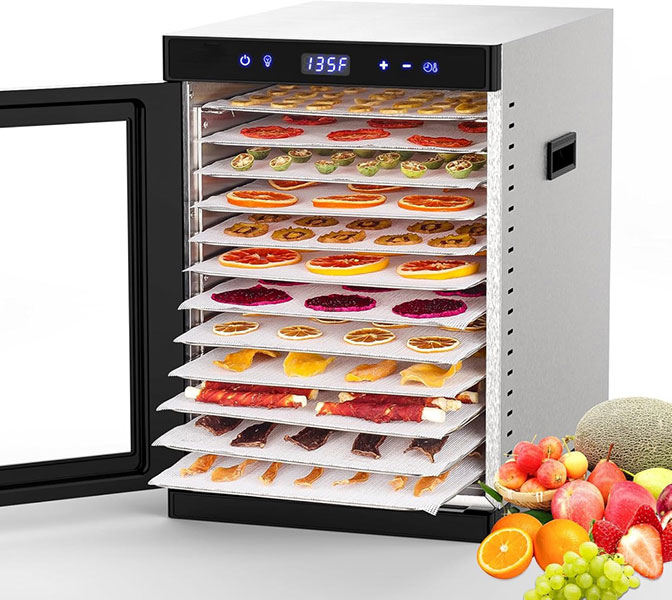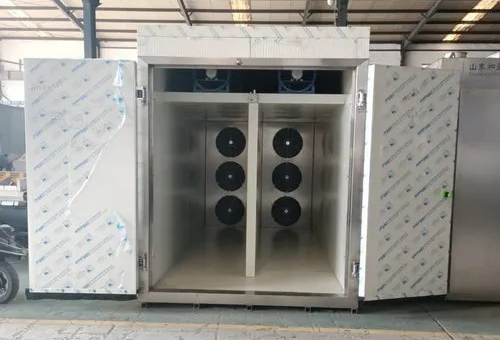
Content Menu
● Introduction to Dehydration Machines
>> Benefits of Using Dehydration Machines
● Types of Dehydration Machines Available in Sri Lanka
>> 1. Heat Pump Fruit Dehydration Machines
>> 2. Continuous Mesh Belt Dehydration Machines
>> 3. All-in-One Fruit Dehydration Machines
● Features to Consider When Choosing a Dehydration Machine
● How Dehydration Machines Work
● Popular Brands and Models in Sri Lanka
● Solar Powered Dehydration Machines
● Market Demand and Economic Benefits
● Maintenance and Cleaning
>> Tips for Cleaning Your Dehydrator:
● Pricing and Customization
● Conclusion
● FAQs
>> 1. What types of food can be dehydrated using a dehydration machine?
>> 2. How do I maintain a dehydration machine?
>> 3. What are the benefits of using a dehydration machine over an oven?
>> 4. Can I use a dehydration machine for commercial purposes?
>> 5. How does a solar-powered dehydration machine work?
● Citations:
Choosing the right dehydration machine in Sri Lanka involves several key considerations, including the type of food to be dehydrated, the desired capacity, and the features that best suit your needs. Dehydration machines, or food dehydrators, are essential for preserving fruits, vegetables, meats, and herbs by removing moisture, thus extending their shelf life and maintaining nutritional value.

Introduction to Dehydration Machines
Dehydration machines are designed to remove moisture from food at controlled temperatures, preserving nutrients and flavors. They are widely used in households and industries for making dried fruits, vegetables, and meats. In Sri Lanka, these machines are particularly useful due to the country's tropical climate, where fresh produce can spoil quickly.
Benefits of Using Dehydration Machines
1. Nutrient Preservation: Dehydrators help retain the natural nutrients in food by drying at low temperatures.
2. Cost Savings: Drying excess food reduces waste and allows for bulk purchasing.
3. Versatility: Suitable for a wide range of foods, including fruits, vegetables, meats, and herbs.
Types of Dehydration Machines Available in Sri Lanka
1. Heat Pump Fruit Dehydration Machines
These machines are popular for their energy efficiency and ability to maintain the quality of dehydrated products. They use a heat pump system to circulate hot air, ensuring uniform drying without significant energy loss.
2. Continuous Mesh Belt Dehydration Machines
Ideal for large-scale operations, these machines use a continuous belt to dry food evenly. They are suitable for high-volume production and can handle a variety of food types.
3. All-in-One Fruit Dehydration Machines
Compact and easy to operate, these machines are perfect for small businesses or home use. They offer a simple setup and are energy-efficient.
Features to Consider When Choosing a Dehydration Machine
- Adjustable Temperature Settings: Essential for different types of food.
- Even Airflow Distribution: Ensures uniform drying.
- Capacity: Choose based on the volume of food to be processed.
- Energy Efficiency: Important for cost savings and environmental impact.

How Dehydration Machines Work
Dehydration machines use a heating element and a fan to circulate warm air across food trays, removing moisture without cooking the food. This process helps preserve nutrients and flavors.
Popular Brands and Models in Sri Lanka
- Batapola Dehydrator: Known for its user-friendly design and adjustable temperature settings.
- Baixin Machinery: Offers a range of fruit dehydration machines with advanced features.
Solar Powered Dehydration Machines
For those interested in sustainable options, solar-powered dehydration machines are an innovative choice. They use solar panels to power fans that circulate air, ideal for areas with abundant sunlight.
Market Demand and Economic Benefits
Dehydrated fruits and vegetables are in high demand both locally and internationally, making them a lucrative business opportunity in Sri Lanka. Exporting dried fruits and vegetables can be a profitable venture, especially for entrepreneurs looking to capitalize on the country's agricultural produce.
Maintenance and Cleaning
Regular maintenance and cleaning of the dehydrator are essential for its longevity and consistent performance. Follow the manufacturer's guidelines for cleaning and storage. Regularly inspect the machine for signs of wear and tear, and address any issues promptly to prevent malfunctions.
Tips for Cleaning Your Dehydrator:
1. Unplug the Machine: Before cleaning, ensure the dehydrator is unplugged.
2. Soak Parts: Soak trays and liners in warm soapy water for about 20 minutes.
3. Use a Soft Cloth: Clean the exterior with a mild detergent and a soft cloth.
4. Avoid Submerging: Never submerge the machine in water.
Pricing and Customization
The price of dehydration machines in Sri Lanka varies widely, depending on the type and capacity. Common fruit dehydration machines range from $3,500 to $50,000, while mesh belt machines can cost between $30,000 and $100,000. Customized options are also available, allowing buyers to tailor machines to their specific needs.
Conclusion
Choosing the right dehydration machine in Sri Lanka requires careful consideration of your specific needs, whether for household use or commercial purposes. By understanding the types of machines available and their features, you can select a dehydrator that enhances your food preservation capabilities while ensuring cost efficiency and sustainability.

FAQs
1. What types of food can be dehydrated using a dehydration machine?
- Fruits, vegetables, meats, herbs, and flowers can be dehydrated using these machines.
2. How do I maintain a dehydration machine?
- Regularly clean the trays and exterior, check for any blockages in the fan, and ensure proper storage when not in use.
3. What are the benefits of using a dehydration machine over an oven?
- Dehydrators provide precise temperature control, are more energy-efficient, and preserve nutrients better than ovens.
4. Can I use a dehydration machine for commercial purposes?
- Yes, commercial-grade dehydration machines are available for large-scale operations, offering higher capacities and advanced features.
5. How does a solar-powered dehydration machine work?
- It uses solar panels to power a fan that circulates air, drying food without electricity.
Citations:
[1] https://www.bxdryer.com/news/industry-news/fruit-dehydration-machine-in-sri-lanka-news.html
[2] https://www.youtube.com/watch?v=yY0RS1vEryk
[3] https://airtekdehydrator.com/blog/essential-tips-for-optimal-machine-performance/
[4] https://www.alibaba.com/showroom/food-dehydrator-sri-lanka.html
[5] https://www.pasanenterprises.lk/dehydrator-machines
[6] https://farmerswiferambles.com/care-for-your-food-dehydrator/
[7] https://batapolaproducts.lk/product/batapola-dehydrator/
[8] https://www.growalife.org/shop/food-dehydrator-st-02-capacity-100l-967
[9] https://www.thepurposefulpantry.com/easy-tips-to-clean-your-dehydrator/
[10] https://seedtopantryschool.com/quick-tips-on-how-to-clean-your-dehydrator/











